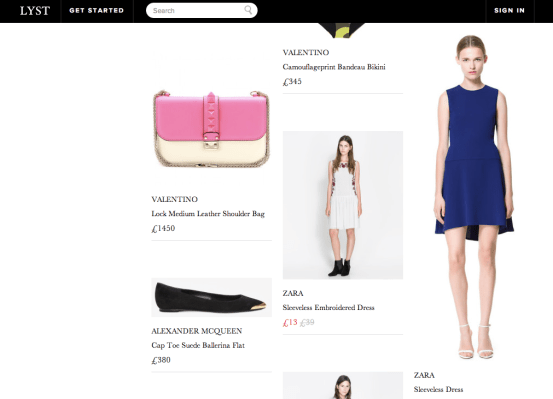Lyst, a platform that aggregates different fashion commerce sites in a single place with a “universal shopping cart”, is today announcing a $14 million round of funding — money that it will use to ramp up its marketing and to hire more data scientists and other engineers to keep building out its algorithms to compete against the likes of eBay, the Fancy and other one-top-shop online marketplaces.
It is also forging ahead with an interesting progression on its e-commerce model by taking the experience out to brick-and-mortar stores as well, starting with a partnership with PayPal around Beacon, its Bluetooth LE in-store initiative that will give users location-specific alerts when they are in the vicinity of a particular section of a store where there is an item they may want to buy.
“We have some exciting things coming up here,” founder and CEO Chris Morton tells me. “At this stage we can share our plan to launch a partnership with PayPal around the use of Beacon devices.” He says that there will be further “really interesting partnerships using our API” to come soon, too.
The the move into physical commerce is not new — Morton told me about those ambitions back in 2012 when Lyst raised a $5 million Series A. “We would love to give you an experience where we could solve discovery in the real world,” Morton told me at the time. “Walking down Bond Street or Fifth Avenue and showing you where you can find products that have been recommended on Lyst… We have a lot of ideas about how to do this.”
The Series B round was led by Balderton Capital (originally an offshoot of Benchmark Capital in Europe, now independent). DFJ Esprit and Accel — who also invested in its Series A — also participated, as did a number of notable new angels. They include Carmen Busquets of Net-A-Porter; Paul Forster of Indeed.com and John Lindfors, a managing partner Yuri Milner’s DST Investment Management.
The investment marks another win for fashion startups in the UK and London in particular — following on from the city’s place as an important center for the fashion industry at large. On the tech front, London-based companies like Farfetch, ASOS, Net a Porter and the Business of Fashion have all been making waves.
Lyst, which was founded in 2010, has built out a platform that aggregates inventory from across a number of other fashion e-commerce sites — typically those that focus on a specific brand (Saks, Burberry, Net-A-Porter, J.Crew, Lane Crawford and Balenciaga are some of its partners, to give you an idea of where it pitches the product).
Lyst then goes one step further to incorporate social media and other content — for example from notable fashion bloggers — for a more curated experience. It also gives users information about details like stock availability — giving them the option to search and browse only by what is actually able to be purchased right now. In a space that has a lot of potential but has been partly been held back by consumers wary of buying clothes online, all of this gives them more information to make purchasing decisions.
The effect has been a positive one: Lyst says that the business grew over 400% in 2012, and 400% again in 2013. It now has 2 million shoppers visiting it each month, with the average basket size around $300, according to CEO and founder Chris Morton. That works out to more than $60 million in sales for its partners. (Lyst would make far less than that, based on an affiliate fee of between 7% and 20%.)
Morton tells me that the economics of the company have changed “profoundly” with the launch of the universal shopping cart (before there would have been a more fragmented experience with different check-outs). Right now, the company is seeing some 57% of purchases coming from North America, and it’s aggregating over $2 billion worth of goods.
